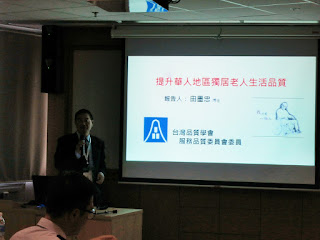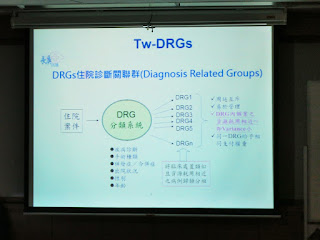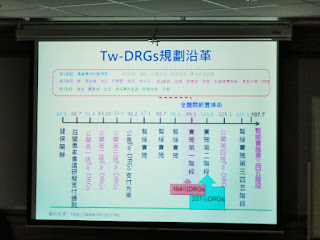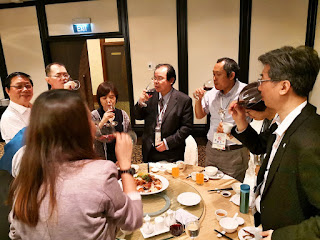The 3rd World Summit for Chinese Quality
(WSCQ) was organized by Pre-World Alliance for Chinese Quality (WACQ) (全球華人品質聯盟(籌)), co-organized by Singapore Quality
Institute (SQI)
at NTU@one-north campus, Executive Centre on 8 Nov 2018. The founding members of Pre-World Alliance
for Chinese included China Association for Quality
(CAQ), Chinese Society for Quality (CSQ), Hong Kong Society for Quality (HKSQ)
and Singapore Quality Institute (SQI).
This Alliance was established after the 3rd Chinese Quality
Forum (CQF) in Beijing in 2015. During
the afternoon session, HKSQ team took a group photo in NTU@One-North Alumni
House with WSCQ banner.
(Left: Ms.
Minda Chiang, Prof. Xingsen Li (李興森), I, Prof. Yang Chunyan (楊春燕), Dr. Aaron Tong and Dr. KS Chin)
In
afternoon, there were two parallel sessions. I was presented in Session A and
Minda attended this session.
Session B
Dr. KS
Chin (Former Chairman, HKSQ) was the session chair.
The first speaker in Session B was Mr. Zhang Ligang (張立剛) and his presentation entitled “Exploration and Practice of Transformation and Upgrade of Urban Public Transportation Service” (城市公交服務實施轉型升級的探索與實踐). Firstly, Mr. Zhang briefed their company’s development since 2000.
Then Mr.
Zhang mentioned the situation of service industry such as Urbanization, Information
Technology, Knowledge Economic, Assistant Manufacturing Upgrade, Enhancing Life
Quality and Job Creation.
However, Mr. Zhang shared some difficulties about their industry transformation included Staff Capability, Government Regulation, Slow Market Extension, Service Design behind the Customer requirement, and Traditional Management outdated.
Finally,
Mr. Zhang stated their transformation strategy included Staff Training, System
Establishment, Management Upgrade and Technical Support. At the end, he shared the transformation
result involved National Quality Award, Public Transportation Award, Number 1
Brand, etc.
The second speaker was Dr. Dennis Tien (田墨忠) (CSQ) and his topic was “Improve the quality of life of elder who living alone in Chinese areas” (提升華人地區獨居老人生活品質). He said one of sad reasons of elder was lonely.
Dr. Tien analyzed and compared data of elder who living alone in China, Taiwan, Hong Kong, Macau and Singapore. The trend of ageing society was obviously!
After
that he identified seven risks of elder who living alone involved acute illness, accident, cheat, safety, forgetting
/ loss memory, depress and no home. In
China, legal / regulation for elder right protection and amendment was issued
in 2012. Finally, Dr. Tien concluded there were different reasons caused elder
living alone. The common suffer of elder
was lonely.
Prof.
Yang Chunyan (楊春燕) (Director,
Institute of Extenics and Innovation Methods, Guangdong University of
Technology) was the third speaker in the Session B and her presentation topic
named “Extenics + AI Research Progress” (可拓學+AI的研究進展). She said using AI to solve contradiction program was the trend under
innovation era.
Firstly,
Prof. Yang introduced the Extenics development history and characteristics. There were two research purposes that one was
to enhance human intelligence (using Extenics plus Innovative Education) and
the other purpose was to improve machine intelligence (Extenics plus AI to be
Extension Intelligence).
And then
Prof. Yang briefed their achievement such as National Nature Science Foundation
Funding items – HowNet and GEP extension strategic generation systems, extension
design research, as well as, different publication and books. Finally, she concluded that Extension
Intelligence was one of key research direction and the Extenics plus AI could
apply into product & service quality innovation.
Prof.
Xingsen Li (李興森) (Deputy Director,
Institute of Extenics and Innovation Methods, Guangdong University of
Technology) was the fourth speaker in the Session B and his presentation
entitled “Extenics + AI assist Service Quality Management” (可拓學+AI助力服務品質管理).
Prof. Li
mentioned the customer requirement from product to service to standard and
asked “What’s the next?” Then he briefed the Big Data resource that could be
transformed from data to knowledge and then to strategy for decision making.
After that
Prof. Li shared the Customer Loss Alert and Transformation System which employed
Extension Data Mining technology. The
whole process was demonstrated in the following diagram. Finally, Prof. Li said this system could be
employed in bank, e-commerce, and insurance for customer retention, credit
assessment and risk management.
The last
speaker in the Session B was Ms. Li Fengjun (李逢君) and her topic was “Improve the Medical
Care Quality and Efficiency of Total Hip Arthroplasty through Data-driven Clinical
Treatment Programs” (以數據驅動臨床治療計劃提升『全髖關節置換術』醫療照護品質與醫療效率).
Ms. Li
briefed their study and introduced the Diagnosis Related Groups (DRGs)
classification system for analysis.
The
implementation plan of DRGs were described and some literatures showed the
Clinical Documentation Improvement (CDI) were obtained (Adele L. Towers,
2013). CDI plan needed to cooperation
between Doctors, Health information management, coding staff and clinical
experts (Megan E, 2015).
During
the tea break, I visited the poster area.
The fifth keynote speaker was Prof. TN Goh (吳桐毅) (SQI) and his presentation title named “Quality Professional under the Goal of Excellent Service” (以卓越服務為目標的質量專業). In the beginning, Prof. Goh showed different language to express Service and the red color one was Russia language because we had guests from Russia.
Then Prof. Goh showed a photo taken with Prof. A. Parasuraman who described Service Quality in details in 1988. The SERVQUAL service quality gap model came as a facilitator to measure, evaluate and manage quality analysis of services and had also named as a method of analysis of the deficiencies in service.
After
that Prof. Goh compared the Four Great Inventions of Ancient China (papermaking,
gunpowder, printing techniques and the compass) and so called Four Great New
Inventions of Modern China (Dockless Shared Bicycles, High-speed Rail, Alipay
and E-commerce); he found that they were developed from product to
service.
And then
he introduced 3C to maintain the excellence service. 3C were stand for Customer, Changes and Competiveness.
He raised some examples for discussion such as McDonald, Nasi Lemak,
Prof.
Goh quoted Mr. GE Tan presentation about 6 level of service. He explained some characteristics of service
quality included good/bad unbalance, timeframe of quality performance, variety affected
performance, Prosumerism, Sharing not one-way due, etc. Lastly, he used quality maturity process
table to demonstrate from customer satisfaction to customer loyalty included
their affect, timeframe and scope. Prof.
Goh quoted Leo Tolstoy (1828~1910) statement that “Happy families are similar. Unfortunate families
have their own misfortunes.” And then he changed the statement and concluded
that “Success Services are similar. Failure Services have their own reasons.”
The
sixth keynote speaker was Mr. Kent Zhang (張健) (Director, QM Office, Xiaomi
Corporation) and his presentation topic was “Xiaomi striving for Excellent Service
Quality” (小米邁向卓越服務品質). He told us he joined Xiaomi
since May 2012 and explained that Xiaomi is an Internet company based on
Mobile, Intelligence Hardware and IoT Platform as core.
Then he
introduced that Xiaomi established on 6th April 2010 and IPO on 9th
July 2018 in Hong Kong. Xiaomi only used
7 years to achieve 100B income that was faster than Google, Facebook, Apple,
Alibaba, Tencent and Huawei.
After
that Mr. Zhang described the Xiaomi Model named Cyclone Diagram (旋風圖) which related to three axis
named Hardware, Internet and New Retail.
Finally,
he explained Xiaomi’s Smartphone-Centered
Strategy. Layer 1 is smartphones peripheral devices. Layer 2 is Smart Devices
and Layer 3 is Lifestyle Products. They employed low margin high volume
strategy. Xiaomi succeed to take 31% market share in India.
The
seventh keynote speaker was Mr. Leo Liu (劉觀生) (Project Consultant, CSQ) and
his topic entitled “The Essence and Quality of Service” (服務的真諦與品質).
Firstly,
Mr. Leo Liu explained the Chinese character of Service in Matter and Human
side. He integrated Eastern and Western
understanding of service included Observation, Unique, Respect, Protect, Commitment
and Delivery.
The
model of the Essence of Service was proposed as following diagram. The essential result was brand effectiveness.
Lastly,
Mr. Leo Liu introduced the Service System and Process from Matter to Human.
Prof. Yang Chunyan (楊春燕) and Prof. Xingsen Li (李興森) (Director & Deputy Director, Institute of Extenics and Innovation Methods, Guangdong University of Technology) were the last keynote speaker and their topic named “China's Original Discipline – Extenics and its application in Service Quality Innovation” (中國原創學科可拓學及其在服務品質創新中的應用). Prof. Yang briefed the research background such as contradiction problem in quality management.
Then
Prof. Yang introduced the inventor of Extenics – Prof. Cai Wen who started to
study this topic since 1976. The first
research paper issued in 1983. After that a new discipline was born and
Extenics included Extension Theory, Extension Innovation Method and Extension
Engineering. Prof. Yang briefed the
Extension Innovation Method and its Extension Analysis.
She also
mentioned the Conjugate Analysis that all things could be considered into four
dimensions and they were Nonmaterial Part and Material Part (Physical), Soft
Part and Hard Part (Systematic), Latent Part and Apparent Part (Dynamic), as
well as, Negative Part and Positive Part (Antithetic). After the extension, many ideas need to be
transformed as solutions and strategies.
The Transformation methods were discussed.
After
that Prof. Yang briefed their internationalization progress and mentioned HKSQ
supported in the 1st World Summit for Chinese Quality as one of
keynote speech to promote to all Chinese Quality Professionals.
Finally,
she introduced their achievement and issued articles in “China Quality” magazine
through CAQ to promote Extenics into Quality field in China.
At the
end, Prof. Yang discussed their Extension Model of Service Quality Innovation. It was based on Internet and Big Data support
to classify the information using Extenics formulation as database for
innovation.
After
all keynotes presentation, WACQ representatives presented appreciation
certificate to all keynote speakers and session chairs.
I also represented WACQ to present appreciation certificate to poster presenters and the middle one in the diagram was the best poster awardee.
Lastly, Ms.
Wang Lin (王琳) (Deputy Secretary General) gave a close remark. Then Mr. GE Tan (陳敬賢) (Chairman, SQI) transfer the
WACQ flag to Ms. Wang Lin, indicating that the next summit would be in Beijing.
Video of
Flag transfer.
Aaron and I toasted to CAQ with Ms. Wang Lilin (王麗林).
Then
HKSQ team toasted to each table and took some photos for memory.
Before
the end of dinner, Mr. Leo Liu (劉觀生) gave his book and signed it to me.
The book
named “Brand – Internal Management” (品牌: 內化經營).
Prof.
Yang also received one book from Mr. Leo Liu.
Reference:
China Association for Quality (CAQ) - http://www.caq.org.cn/
Chinese Society for Quality (CSQ) - http://www.csq.org.tw/mp.asp?mp=1
Singapore Quality Institute (SQI) - http://www.sqi.org.sg/
Hong Kong Society for Quality (HKSQ) - http://www.hksq.org/index.asp
History (Past Events & Meeting);
20120526:
The first meeting for the Chinese Quality Forum (華人品質論壇) - http://qualityalchemist.blogspot.hk/2012/05/first-meeting-for-chinese-quality-forum.html
20140314:
Pre-Chinese Quality Forum (華人品質論壇) Dinner Meeting 2014 - http://qualityalchemist.blogspot.hk/2014/03/pre-chinese-quality-forum-dinner-meeting.html
20140315:
The 2nd Chinese Quality Forum (華人品質論壇) - http://qualityalchemist.blogspot.hk/2014/03/the-2nd-chinese-quality-forum.html
20150923:
Pre-Chinese Quality Forum (華人品質論壇) Meeting & Dinner 2015 - http://qualityalchemist.blogspot.hk/2015/09/pre-chinese-quality-forum-meeting.html
20151104:
The 15th China Quality Award cum Chinese Quality Forum – Day 1
20151105:
The 15th China Quality Award cum Chinese Quality Forum – Day 2
20151106:
The 3rd Chinese Quality Forum – Day 3 Work Meeting & Visit TusPark
20160707:
The Pre-World Alliance for Chinese Quality (全球華人品質聯盟(籌)) Meeting - http://qualityalchemist.blogspot.hk/2016/07/the-pre-world-alliance-for-chinese.html
20160708:
The 1st World Summit for Chinese Quality - https://qualityalchemist.blogspot.hk/2016/07/the-1st-world-summit-for-chinese-quality.html
20160709:
Post-WSCQ Seminar on Extenics (可拓學) and its application - https://qualityalchemist.blogspot.hk/2016/07/post-wscq-seminar-on-extenics-and-its.html
20160919:
ANQ-CEC and Pre-WACQ Meeting & Dinner 2016 - https://qualityalchemist.blogspot.hk/2016/09/anq-cec-and-pre-wacq-meeting-dinner-2016.html
20171116:
The 2nd World Summit for Chinese Quality – Part 1 - https://qualityalchemist.blogspot.hk/2017/11/the-2nd-world-summit-for-chinese.html
20171116:
The 2nd World Summit for Chinese Quality – Part 2 - https://qualityalchemist.blogspot.hk/2017/11/the-2nd-world-summit-for-chinese_16.html
20171117:
Post - World Summit for Chinese Quality (WSCQ) Technical Visit - https://qualityalchemist.blogspot.hk/2017/11/post-world-summit-for-chinese-quality.html
20181107:
Per – The 3rd World Summit for Chinese Quality (WSCQ) Visit - https://qualityalchemist.blogspot.com/2018/11/per-3rd-world-summit-for-chinese.html
20181108:
The 3rd World Summit for Chinese Quality (WSCQ) – Day 1 (Part A) - https://qualityalchemist.blogspot.com/2018/11/the-3rd-world-summit-for-chinese.html
20181108:
The 3rd World Summit for Chinese Quality (WSCQ) – Day 1 (Part B) - https://qualityalchemist.blogspot.com/2018/11/the-3rd-world-summit-for-chinese_8.html
20181109:
The 3rd World Summit for Chinese Quality (WSCQ) – Day 2 (Technical Visit) - https://qualityalchemist.blogspot.com/2018/11/the-3rd-world-summit-for-chinese_9.html




















































沒有留言:
發佈留言